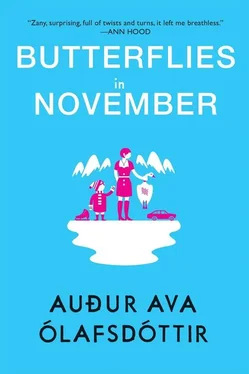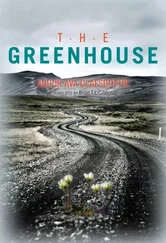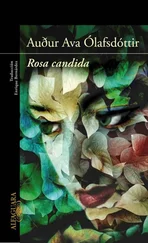“Was there an inscription on the bracelet?”
“Yes, there was an inscription on the bracelet. Are you going to tell me you didn’t even read the inscription?”
Sometime later, I notice him peeping at my diary, rapidly skimming through it. I think he might be saying something in the living room, but the whistle of the kettle prevents me from hearing what. When I return he is sitting in white socks and underpants on the sofa bed and has rolled up the sleeping bag. I get the feeling he might have been crying.
“The good thing about you is that you never placed any demands on me.”
Then I sit down beside him, pat him on the arm and, after a moment, say: “Yes, I can well understand you, but sometimes people have to make decisions, go home to Nína Lind now.”
“I might be pathetic, but I’m not a bastard.”
He has stood up and walks towards the living room window where he pauses a long moment, his back turned to me, peering into the morning darkness.
“It sure is incredibly dark here.”
When he is about to leave, he can’t find his scarf.
“If you ever find it, it’s purple with yellow stripes and a brown fringe, Nína Lind knitted it.”
Before leaving, he asks me if there’s another man in the picture. I don’t answer.
“You’re a quick operator,” he says. “I take my eyes off you for one second and you’re already hitched up with someone.”
“That’s a bit of an overstatement.”
“We could have such a good time together, travel and do lots of things.”
Stepping out onto the deck, he abruptly swivels on his feet to pull me into a tight embrace. I can tell it’s a quality impermeable anorak that he’s wearing, it insulates well.
“I just wanted to tell you that I just texted Nína Lind to ask her to marry me.” He then moves away a few steps before turning one final time to ask:
“Have you any idea where the box with the Christmas decorations got to?”
“Wasn’t it in the garage?”
“Wait a minute, did you leave all the stuff in the garage?”
“I forgot it, didn’t you take it? The sleeping bags were there.”
“Jesus Christ, did you give the new owners a year’s supply of toilet paper, the bag of walrus teeth from Greenland and all the Christmas decorations, including the blinking singing reindeer?”
When I walk back into the house, I see that he has left a handwritten note for me on the table.
Tumi is knitting and I tell him I’m popping out to the shop to buy some prunes to make halibut soup, and that I’m not taking the car, just running down the hill. I say it to him in three different ways:
“I’m just running down to the shop, you just stay put in the meantime and carry on knitting.”
He nods and sticks his needle into the stitch, with some yellow yarn double-wrapped around his middle finger.
This is the first time I leave him alone so I hurry. The prunes are carefully hidden away in the shop, so I have to ask the girl at the cashier to help me find them, but she needs to finish serving two other women first.
When I come running back up the hill I see him rushing towards me, soaking wet in his socks, with outstretched arms. I lift his feather-light body into the air. His face is twisted with worry, all wrinkled like an old man, and I can’t see his eyes through the lenses of his glasses, which are all fogged up with tears. His heart pounds furiously like a little bird’s. Auður’s descriptions of him as a premature baby in the incubator spring to mind — almost transparent in colour, his skin so thin that one could see his underlying organs.
“I could have died”, he says. “I thought you’d left me.” He wraps his wet arms around my neck.
I show him the bag of prunes. “Come on,” I say, “let’s go make some silver tea. Then we’ll make some soup the way your mommy does and, after that, we’ll go to the cinema. Have you ever been to a cinema?” I don’t tell him I’ve been invited out to a film and that I’d been thinking of getting a babysitter for him.
There’s an Italian film festival in the village, three Italian movies are being screened on three consecutive Thursdays, at eight. That means we’ll be back in the house at about ten, which is a bit late for a four-year-old child.
We take the car. The youth in the box office assures me that, even though the film isn’t advertised as a kid’s movie, there’s nothing in it that would disturb a child. We join the queue by the door behind eight other spectators, with Tumi clutching the tickets in his outstretched hand. Everyone is staring at us.
My friend appears, kisses me on the cheek and shakes the boy’s hand, greeting each other as equals, man to man. The viewers are watching us. I ask Tumi if it’s OK if our friend sits with us. It’s OK. We lead him into the cinema and he chooses the third row in the middle and wants to sit between us. It’s a bit too close for comfort, but I’m not sure how well he sees the screen, with his eyesight. It’s bad enough that he can’t hear the words or the music properly. The other guests spread out in the back rows, leaving a gap of about half the cinema between us. We’re segregated from them, just like our chalet. La Vita è bella begins.
The boy is no bother in the cinema and sits perfectly still throughout the film, watching events unfold on the screen. He’s not interested in any of the pastilles because he’s too busy watching the movie. I frequently glance at him and don’t know how much he is taking in, or whether he wants me to interpret it for him, tell him the story. He does, however, seem to be reading the subtitles. Then I notice that he sometimes stares at me at length, that they both sometimes look at me, the two men, together. I smile at them.
During the break Tumi eats a pastille and gives one to me and one to my friend. Then he closes the box. It’s a drag for him not to be able to lip-read the actors on screen and follow their mouth movements. He sees nodding heads, people squinting their eyes and laughing, but he can’t grasp the words.
His eyes barely reach the top of the seats, so I lift him up and sit him on my lap after the intermission. He’s no taller than a three-year-old child; I can see the screen over his head. Our friend slips into the boy’s seat.
“Was that for pretend?” Tumi asks when the lights come back on.
Should I tell him that it’s all for pretend? That you can see the reflection of spotlights in those make-believe tears?
“No, the things that we experience and imagine are also real,” I say, and he knows exactly what I mean.
“You don’t need a man,” he says from the back seat as I’m fastening his safety belt in the car, “you have me.”
“Who says I’m looking for a man?”
“You look at him.”
“Really?”
“And he looks at you.”
I don’t tell him I’m expecting a guest when he falls asleep.
Everyone gets a nocturnal visit at some stage. There are no curtains in the windows, no point in locking out the darkness when there’s nothing but brown lyme grass and heather in front of them, and nothing behind us but the brown moors. Everything is still in the darkness outside. Five degrees, and for the first time in ages there is a ray of moonlight, which filters down diagonally from the top left-hand corner of the window, like a subtle reading lamp. Despite the day’s rainfall, some clothes are still hanging on the sheltered line on the deck. Inside the scene is as follows: I’ve finished reading a story to Tumi, who is now sleeping with the kitten. I limit myself to the candlelight in the living room, coupled with the glow of the moon, that spotlight provided by the Almighty above. On the window sill there is a blue boot with a yellow rim, size 26, and our pet butterfly is up and about. How much longer can it live for? The time is 00:17 and I hear the gravel crunching under his feet. Not only am I connected to the moon and stars above, but I’m also in close intimate contact with the Santa Claus, who comes to visit me every night. Not down the chimney, but over the railing on the deck in his black boots. He swiftly tackles the hill, with the moon at his back and a pink halo hovering around his head. He slips out of the darkness over the glittering Christmas lights into the candlelight, like a true professional. First his feet, clad in black leather boots, and then his red coat with its white fur trim and black belt.
Читать дальше












